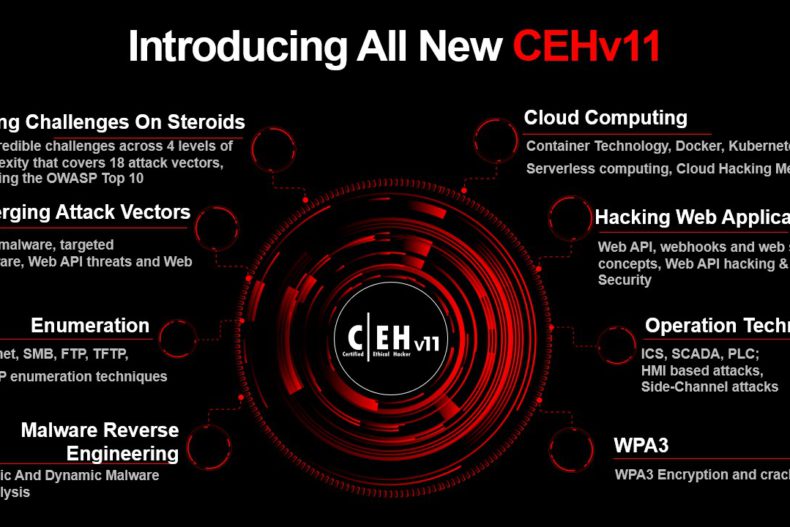What Are the Certified Ethical Hacker (C|EH) Certification Requirements?

Ethical hacking is one of the most effective ways to make systems and networks as resistant to cybercrime as possible, but a successful ethical hacker needs to be as skilled as the malicious hackers trying to gain unrestricted access to systems and data. As a cybersecurity professional, it’s essential to stay ahead of the curve so that you’re aware of new hacking techniques and tools well before you have to confront them.
EC-Council’s Certified Ethical Hacker (C|EH) program is the best way to become an ethical hacker with world-renowned credentials. The C|EH program provides learners with a comprehensive range of skills and a deep understanding of ethical hacking by combining theoretical instruction with hands-on training. Once you pass the final exam and earn your C|EH certification, you’ll be able to test a wide array of systems to discover their vulnerabilities before malicious hackers can exploit them. These skills make certified ethical hackers valuable assets to businesses and organizations as reliance on digital and online infrastructure increases worldwide (Galov, 2021).
What Will You Learn in the Certified Ethical Hacker Course?
Both experienced cybersecurity professionals and those who are just starting out will benefit from the C|EH program. Below are some of the top subject areas covered in the C|EH course:
- Modern exploit technologies. Hackers use various automated methods and tools to access systems, devices, and networks. In the C|EH program, you’ll learn about these techniques, including those targeting emerging technologies like the Internet of Things (IoT), and how to leverage them to test the security of systems by launching your own authorized and lawful attacks.
- Malware analysis. Malware is software specifically designed to disrupt and enter a system for the purpose of stealing data or causing other security breaches. You’ll learn how to identify malware, even when it appears innocuous, as well as how to implement preventative measures to block malware from causing a data breach or accessing a network.
- Case studies. The C|EH program focuses on several case studies and current events that illustrate how hackers have exploited weaknesses and gained access to information in even the most protected networks. The C|EH program includes an in-depth analysis of these incidents so you can familiarize yourself with the techniques used by advanced malicious hackers all over the world.
- Hands-on hacking challenges. In addition to classroom instruction, much of the C|EH coursework comprises hands-on live challenges that allow you to apply what you’ve learned to real-world scenarios. The program offers two dozen code-breaking hacking challenges that move through four levels of difficulty as you progress in the course. By the end, you’ll have developed a robust skill set honed through experience that you can then apply to future scenarios you encounter as an ethical hacker.
- Endless tips and techniques. After completing the C|EH program, you’ll be familiar with all of the latest techniques in a hacker’s toolbox. From advanced social engineering tactics to how to use—and combat—malware, you’ll have a complete understanding of ethical hacking, with access to resources covering thousands of hacking tricks and tools.
CEH Course Eligibility
There are two paths that applicants can choose from to be eligible for the final C|EH exam. The first is to attend an official EC-Council training course, which is designed for all skill levels. The training course does not require previous cybersecurity experience.
The second path allows applicants with at least 2 years of previous information security experience to skip the course and go directly to taking the certification exam. Applicants must first submit evidence of their previous experience and should have knowledge in the following fields:
- Information security and ethical hacking
- Reconnaissance techniques
- System hacking phases and attack techniques
- Network and perimeter hacking
- Web application hacking
- Wireless network hacking
- Mobile platform, IoT, and operational technology (OT) hacking
- Cloud computing
- Cryptography
Course Duration
EC-Council has designed this course as a bootcamp to accelerate your journey to becoming a C|EH. The 5-day, 40-hour program is designed to maximize learning and get you ready for action as soon as possible.
At the end of the course, you’ll need to pass a 4-hour exam composed of multiple-choice questions that test what you have learned. Once you pass the C|EH exam, you’ll have the opportunity to continue sharpening your ethical hacking skills and achieve further recognition in the field of ethical hacking with the C|EH (Master) credential.
Get Started with the C|EH Certification
Ethical hacking is one of the most in-demand skills in cybersecurity today. Learn how to enroll in the C|EH course, and contact EC-Council today with any questions about the C|EH program or any of our other industry-respected cybersecurity certifications.


